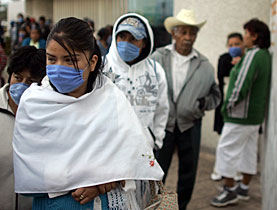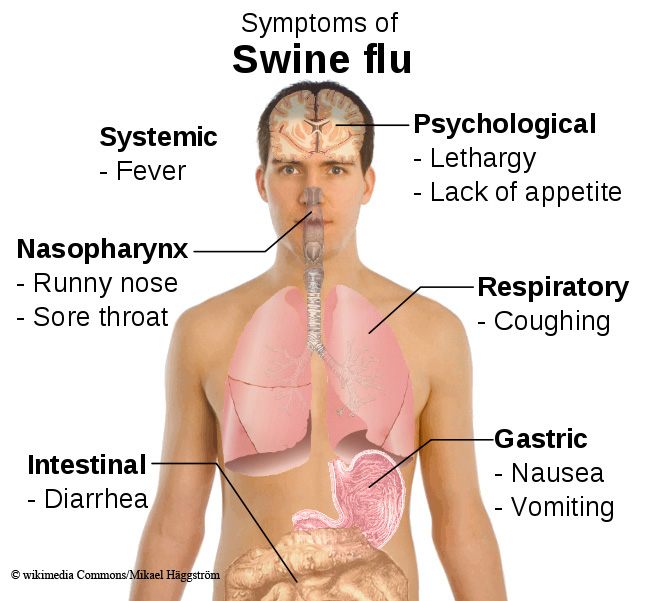
Swine flu spreads, five Swiss checked

The swine flu virus which is believed to have killed up to 149 people in Mexico may have contaminated five Swiss, according to the Federal Health Office.
Health Office spokesman Jean-Louis Zürcher said on Monday the five, who had just returned from Mexico, all had the symptoms of influenza and had visited their doctors as a precautionary measure.
However, there was no conclusive evidence they had swine flu.
The disease, which has prompted health officials worldwide to be on red alert, has spread to the United States, Canada, and as far away as New Zealand.
Health authorities in Spain reported the first case in Europe and on Monday evening two people in Scotland tested positive, according to Scotland’s health minister. Both individuals were said to be recovering well.
The head of the Health Office in Bern, Thomas Zeltner, said the Swiss authorities were trying to do a balancing act.
“We do not want to cause panic but we are concerned because it is a new illness with the potential of a pandemic,” he told Swiss radio.
Well prepared
“If it should come to us, we are better prepared than ever before because we have learnt from Sars (Severe Acute Respiratory Syndrome) and bird flu.”
He noted there would be further information on Tuesday, including advice from experts at the Geneva-based World Health Organization (WHO).
The Swiss authorities will then decide whether to take further measures, notably setting up the national task force in cases of a pandemic or issuing official travel instructions.
Zeltner also noted that the disease could be transmitted from human to human.
He explained that the virus found among American patients was a swine virus combined with a part of human and bird flu viruses. It had never been seen before.
“Why it is affecting young, healthy people is not yet clear and is under investigation.”
Hotline
Switzerland has set up a telephone hotline (031 322 2100) to give advice to travellers who plan to travel to the affected areas or who have just returned. There is also an internet site where people can find information (www.pandemia.ch).
Officials said the service was flooded with requests for advice on Monday by people who asked whether the virus could be transmitted through eating pork.
The Health Office promised to increase the capacities of the hotline on Tuesday.
“Our services and Swiss embassies are closely watching the situation in the countries affected by this new type of swine flu among humans,” Swiss foreign ministry spokesman Eric Reumann told swissinfo.
He added the ministry was advising Swiss who travelled to the countries affected to respect local hygiene recommendations, including regular hand washing and avoiding public places.
There is currently no official Swiss instruction for travellers as such as a step could have legal consequences.
The Health Office is closely monitoring the situation with the WHO and European health authorities.
The European Union’s health chief on Monday advised travellers not to go to areas affected by swine flu but there were no formal instructions.
“Avoid non-essential travel”
“Personally, I’d try to avoid non-essential travel to the areas which are reported to be in the centre [of the crisis],” Health Commissioner Androulla Vassiliou said in a statement.
Asked for details, she said: “People should avoid travelling to Mexico or the United States unless it’s very urgent.”
There are no particular measures being taken at Swiss airports.
Geneva Airport spokesman Bertrand Stämpfli told Swiss radio: “We are following developments closely and are ready to take action, but for the time being there are no particular measures in place.”
As part of its response to the bird flu disease of 2006 and 2007, the Swiss authorities built up a stockpile of the antiviral drug Tamiflu, made by Switzerland’s Roche pharmaceuticals company.
Tamiflu is considered effective against the current swine flu virus, with Switzerland having enough to cover the needs of about a quarter of the population.
Careful with Tamiflu
But Zeltner at the Health Office and other experts warn that it should not be taken without proper medical supervision so that the virus does not become resistant.
Asked about protective masks available in Swiss supermarkets, Zeltner advised people to buy one packet per household as a precaution.
Although the news of swine flu caused jitters on the financial markets, there was speculation that Roche and Britain’s GlaxoSmithKline were set to benefit most as governments and companies stepped up orders for their drugs Tamiflu and Relenza.
Roche’s share price rose by almost four per cent on Monday.
But analysts cautioned that the commercial impact would be muted by the fact that many governments had already placed substantial stockpile orders as a result of the previous threat posed by bird flu.
swissinfo with agencies
To protect from infection:
Avoid close contact with people who appear unwell and who have fever and cough.
Wash your hands with soap and water frequently and thoroughly.
Practise good health habits including adequate sleep, eating nutritious food and keeping physically active.
This swine flu variation, termed H1N1, is an influenza A virus spreading from person to person. It contains DNA from avian, swine and human viruses. Although swine flu viruses normally infect only pigs, they do sometimes cross the species barrier to cause disease in humans, according to the WHO.
It is passed from human to human by sneezing, coughing or by hand contact. The WHO says swine flu is not transmitted to people eating properly handled and prepared pork or other products derived from pigs. The virus is killed in cooking temperatures above 70°C.
Swine flu is characterised by common flu symptoms – sudden fever, muscle aches, sore throat and dry cough – but may cause more severe vomiting and diarrhoea.
New flu strains can spread fast because no one has natural immunity and a vaccine can take months to develop.


In compliance with the JTI standards
More: SWI swissinfo.ch certified by the Journalism Trust Initiative




























You can find an overview of ongoing debates with our journalists here . Please join us!
If you want to start a conversation about a topic raised in this article or want to report factual errors, email us at english@swissinfo.ch.